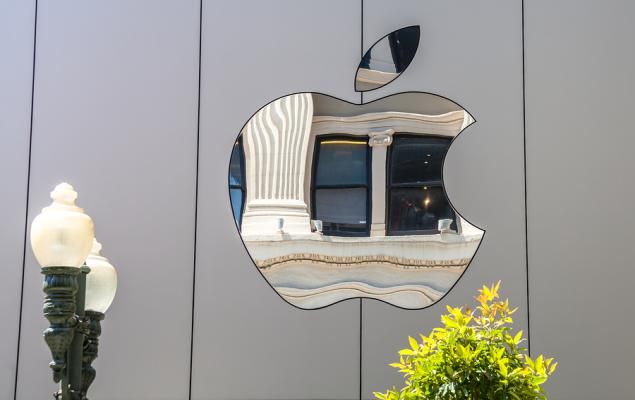
Nonetheless, Apple easily doubled its valuation in just over two years. It had first reached a $1 trillion market cap on Aug 2, 2018. Notably, it has been enjoying a strong run lately. For instance, the stock has averaged a weekly gain of 3.5% since the beginning of June. What’s more, it has particularly performed well this year with its stock price gaining more than 50%.
The company, no doubt, has proven to be resilient to the coronavirus pandemic, and it still generates more than 80% of revenues by selling high-priced devices primarily made in China, where the virus was first identified. By the way, combined revenues for all those high-priced devices jumped 10% year over year in Apple’s most recent fiscal quarter ended Jun 27. Since then, the stock has climbed more than 20%.
Apple, however, isn’t the first company to hit the $2 trillion milestone. Oil and gas giant, Saudi Aramco, did so first. It had briefly hit the coveted mark in December 2019 but has since declined below the figure as its share prices wavered.
Coming back to Apple, the company is currently facing an array of headwinds regarding its App Store business, putting it in the crosshairs of lawmakers and regulatory authorities. Notably, based on regulatory filings, the App Store has been the largest contributor to growth of Apple’s services segment in three of the past fiscal four years. In fact, Apple’s service segment is now the second-largest segment after the iPhone.
But, let’s admit, an almost $2 trillion valuation shows that market pundits expect almost nothing to go wrong for this tech behemoth, and are willing to pay a hefty sum to buy its shares. After all, despite issues, social-distancing environment will continue to fuel growth in the segment that includes the App Store and Apple Pay. Even though Apple saw widespread retail closures in recent times, work-from-home trends and strong online sales will continue to boost overall operations.
Apple, currently, boasts of more than 550 million paid subscribers across its Services portfolio. Further, the App Store continues to draw the attention of prominent developers worldwide, helping the company offer appealing new apps that drive App Store traffic.
<p class="canvas-atom canvas-text Mb(1.0em) Mb(0)–sm Mt(0.8em)–sm" type="text" content="Thus, the Zacks Rank #1 (Strong Buy) company’s expected earnings growth rate for the current and next year is 8.7% and 23.8%, respectively. The Zacks Consensus Estimate for its current year earnings also increased 4.9% over the past 60 days. You can see the complete list of today’s Zacks #1 Rank stocks here.” data-reactid=”37″>Thus, the Zacks Rank #1 (Strong Buy) company’s expected earnings growth rate for the current and next year is 8.7% and 23.8%, respectively. The Zacks Consensus Estimate for its current year earnings also increased 4.9% over the past 60 days. You can see the complete list of today’s Zacks #1 Rank stocks here.
<p class="canvas-atom canvas-text Mb(1.0em) Mb(0)–sm Mt(0.8em)–sm" type="text" content="But it’s just not the company, founded in 1976 by Steve Jobs and Steve Wozniak, that topped the $2 trillion milestone. Amazon.com, Inc. AMZN, Microsoft Corporation MSFT and Alphabet Inc. GOOGL are also vying to reach $2 trillion soon. It is to be noted, Amazon is currently valued at $1.63 trillion, Microsoft at $1.59 trillion and Alphabet at $1.05 trillion. And many experts believe that it’s not a distant dream especially after their blowout June-quarter results.” data-reactid=”39″>But it’s just not the company, founded in 1976 by Steve Jobs and Steve Wozniak, that topped the $2 trillion milestone. Amazon.com, Inc. AMZN, Microsoft Corporation MSFT and Alphabet Inc. GOOGL are also vying to reach $2 trillion soon. It is to be noted, Amazon is currently valued at $1.63 trillion, Microsoft at $1.59 trillion and Alphabet at $1.05 trillion. And many experts believe that it’s not a distant dream especially after their blowout June-quarter results.
Amazon’s $88.9 billion in sales in the quarter ending June 2020 was nearly $8 billion higher than the company’s original guidance. The company’s second-quarter profit of $5.2 billion or $10.30 a share were also five times the consensus estimate. Despite CEO Jeff Bezos spending a huge amount to counter and address COVID-19 pandemic related issues, Amazon’s stunning results were mostly due to an uptick in e-commerce business of 47.8% from last year to $45.9 billion in the second quarter.
Similarly, Microsoft saw its Intelligent Cloud division rake in $13.4-billion sales for the fiscal fourth quarter compared with analysts’ estimate of $13.11 billion. Sales also grew 17% year over year. In fact, Microsoft reported fiscal fourth-quarter earnings of $11.2 billion or $1.46 a share on revenues of $38 billion. Analysts expected profit of $1.38 a share on sales of $36.59 billion.
Lastly, search giant Google’s parent Alphabet also registered revenues of $38.3 billion and profits of $10.13 a share in the second quarter, ahead of analysts’ expectations of $37.3 billion and $7.94 a share. YouTube and Cloud services have been the saving grace for Alphabet. YouTube’s ad business increased 6% from a year ago, while Google Cloud’s revenues climbed 43%.
Basically, the tech bigwigs remained reasonably unscathed amid the current economic downturn owing the pandemic. This is primarily because investors saw that these companies have been gaining immensely from secular trends like cloud computing and robust telecommunications infrastructure — demand for which skyrocketed amid the health crisis.
Amazon, Microsoft and Alphabet, currently, carry a Zacks Rank #3 (Hold).
Biggest Tech Breakthrough in a Generation
Be among the early investors in the new type of device that experts say could impact society as much as the discovery of electricity. Current technology will soon be outdated and replaced by these new devices. In the process, it’s expected to create 22 million jobs and generate $12.3 trillion in activity.
A select few stocks could skyrocket the most as rollout accelerates for this new tech. Early investors could see gains similar to buying Microsoft in the 1990s. Zacks’ just-released special report reveals 8 stocks to watch. The report is only available for a limited time.
See 8 breakthrough stocks now>>
<p class="canvas-atom canvas-text Mb(1.0em) Mb(0)–sm Mt(0.8em)–sm" type="text" content="
Want the latest recommendations from Zacks Investment Research? Today, you can download 7 Best Stocks for the Next 30 Days. Click to get this free report
Microsoft Corporation (MSFT) : Free Stock Analysis Report
Amazon.com, Inc. (AMZN) : Free Stock Analysis Report
Apple Inc. (AAPL) : Free Stock Analysis Report
Alphabet Inc. (GOOGL) : Free Stock Analysis Report
To read this article on Zacks.com click here.
Zacks Investment Research” data-reactid=”60″>
Want the latest recommendations from Zacks Investment Research? Today, you can download 7 Best Stocks for the Next 30 Days. Click to get this free report
Microsoft Corporation (MSFT) : Free Stock Analysis Report
Amazon.com, Inc. (AMZN) : Free Stock Analysis Report
Apple Inc. (AAPL) : Free Stock Analysis Report
Alphabet Inc. (GOOGL) : Free Stock Analysis Report
To read this article on Zacks.com click here.
Zacks Investment Research









